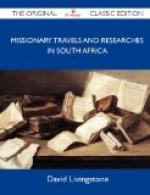* It is probably a species allied to the ’Sternotherus sinuatus’ of Dr. Smith, as it has no disagreeable smell. This variety annually leaves the water with so much regularity for the deposit of its eggs, that the natives decide on the time of sowing their seed by its appearance.
July 27th. We reached the town of Libonta, and were received with demonstrations of joy such as I had never witnessed before. The women came forth to meet us, making their curious dancing gestures and loud lulliloos. Some carried a mat and stick, in imitation of a spear and shield. Others rushed forward and kissed the hands and cheeks of the different persons of their acquaintance among us, raising such a dust that it was quite a relief to get to the men assembled and sitting with proper African decorum in the kotla. We were looked upon as men risen from the dead, for the most skillful of their diviners had pronounced us to have perished long ago. After many expressions of joy at meeting, I arose, and, thanking them, explained the causes of our long delay, but left the report to be made by their own countrymen. Formerly I had been the chief speaker, now I would leave the task of speaking to them. Pitsane then delivered a speech of upward of an hour in length, giving a highly flattering picture of the whole journey, of the kindness of the white men in general, and of Mr. Gabriel in particular. He concluded by saying that I had done more for them than they expected; that I had not only opened up a path for them to the other white men, but conciliated all the chiefs along the route. The oldest man present rose and answered this speech, and, among other things, alluded to the disgust I felt at the Makololo for engaging in marauding expeditions against Lechulatebe and Sebolamakwaia, of which we had heard from the first persons we met, and which my companions most energetically denounced as “mashue hela”, entirely bad. He entreated me not to lose heart, but to reprove Sekeletu as my child. Another old man followed with the same entreaties. The following day we observed as our thanksgiving to God for his goodness in bringing us all back in safety to our friends. My men decked themselves out in their best, and I found that, although their goods were finished, they had managed to save suits of European clothing, which, being white, with their red caps, gave them rather a dashing appearance. They tried to walk like the soldiers they had seen in Loanda, and called themselves my “braves” (batlabani). During the service they all sat with their guns over their shoulders, and excited the unbounded admiration of the women and children. I addressed them all on the goodness of God in preserving us from all the dangers of strange tribes and disease. We had a similar service in the afternoon. The men gave us two fine oxen for slaughter, and the women supplied us abundantly with milk, meal, and butter. It was all quite gratuitous, and I felt ashamed that I could make no return. My men explained the total expenditure of our means, and the Libontese answered gracefully, “It does not matter; you have opened a path for us, and we shall have sleep.” Strangers came flocking from a distance, and seldom empty-handed. Their presents I distributed among my men.




